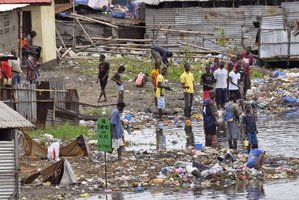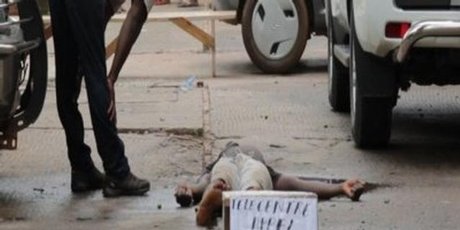Must Listen
- Satan's Ambition
- Counterfeit Christianity
- The Challenge Of Bible Christianity Today
- Three Men On The Mountain
- Greatest Single Issue of our Generation
- Bob Creel The Death Of A Nation
- Earth's Darkest Hour
- The Antichrist
- The Owner
- The Revived Roman Empire
- Is God Finished Dealing With Israel?
Must Read
- Mysticism, Monasticism, and the New Evangelization
- That the Lamb May Receive the Reward of His Suffering!
- The Spirit Behind AntiSemitism
- World's Most Influential Apostate
- The Very Stones Cry Out
- Seeing God With the New Eyes of Contemplative Prayer
- Is Your Church Doing Spiritual Formation? Pt. 1
- Is Your Church Doing Spiritual Formation? Pt. 2
- Is Your Church Doing Spiritual Formation? Pt. 3
- Is Your Church Worship More Pagan Than Christian? [excerpts]
- The Final Outcome of Contemplative Prayer
- The Conversion Through the Eucharist
- Frank Garlock's Warning Against Vocal Sliding
- Emerging Church Change Agents
- Emerging Church Spreading By Seasoning
- The Invasion of the Emerging Church
- Rock Musicians As Mediums (Excerpts)
- Rick Warren Calls for Union
- Does God Sanction Mystical Experiences?
- Discernment or Criticism?
- Getting High on Worship Music
- Darwin's Errors Pt. 1
- Rick Warren and Rome
- Why are There so Many Races?
- The Drake Equation
- Pathway to Apostasy
- Ironclad Evidence
- Creation Vs. Evolution
- The New Age, Occultism, and Our Children in Public Schools
- A War on Christianity
- Quiet Time
- The System of Babylon
- Is the Bible Gods Word?
- Mid-Tribulation Rapture?
- Churches Forced to Confront Transgender Agenda
- Ironside on Calvinism
- The Purpose Driven Church
- Contemplative Prayer
- Calvinisms Misrepresentations of God
- Babylonian Religion
- What is Redemption?
What Art Thinks
- The Coming of Antichrist
- The Growing Evangelical Apostasy
- Obama's Speech on Religion
- Be Ready
- Rick Warren is Building the World Church
- Spanking Children
- A Lamentation
- Worship
- Elect According to Foreknowledge of God
- Why Do The Heathen Rage
- Persecution and Martyrdom
- The Mystery of Iniquity (or Why Does Evil Continue to Grow?)
- Whatever Happened to the Gospel ?
- Quiet Time
- Divorce and Remarriage
- Ecumenism - What Is It?
- The Premillennial ? Pretribulation Rapture (2 Thessalonians 2)
- Right Now!!
- Misguided Zeal
- You're A Pharisee
- Contemplative Prayer
- NEWSLETTER Dec 2019
- NEWSLETTER Jan. 2020
- Fellowship With Your Maker
- Saved and Lost?
- Security of the Believer
- The Gospel
- NEWSLETTER April 2020
- The Believer Priest
- _Separation
- Elect According to the Foreknowledge of God
- The Preservation and Inspiration of the Scriptures
- Replacement Theology
- The Fear of the Lord
- Two Things That are Beyond Human Comprehension
- Knowing God
Pre-Millennialism
- PreTrib. Rapture
- Differences Between Israel and the Church
- 15 Reasons Why We Believe in the Pre - Tribulation, Pre-millennial Rapture of the Church
- The Pre-Tribulation, Pre-millennial Rapture of the Church
- Yet Two Comings of Christ ?
- Hating the Rapture
- Mid-Tribulation Rapture?
- The Pre - Tribulation Rapture of the Church
- The Error of a Mid-Tribulation Rapture and wrong Methods of Interpretation
- The Power of the Gospel
- Why We Believe in the Premillennial Pretribulation Rapture of the Church
Today's Headlines
- Sorry... Not Available

Locally Contributed...
Audio
- Satan's Ambition
- Counterfeit Christianity
- Three Things We All Must Do
- Two Coming Rulers
- Why No Joy
- Message Of Encouragement
- Greatest Single Issue of our Generation
- salvation.
Video
- One World Religion
- Atheism's Best Kept Secret
- Milk From Nothing
- Repentance and True Salvation
- Giana Jesson in Australia - Abortion Survivor - Pt. 1 & Pt 2
- Billy Graham Denies That Jesus Christ is the Only Way to the Father
- Emerging Church & Intersprituality Preview
- Israel, Islam and Armageddon 6 Parts
- Blasphemous Teachings of the 'emergent Church
- Megiddo 1 - the March to Armageddon
- It's Coming, the New World Order
- Creation Vs Evolution Part 1 of 4
- Creation Vs. Evolution Part 2 of 4
- Creation Vs. Evolution Part 3 of 4
- Creation Vs. Evolution Part 4 of 4
- Billy Graham Says Jesus Christ is not the Only Way
- Wide is the Gate
- A Debate: Mariology: Who is Mary According to Scripture?
- The Awful Reality of Hell
- Conception - How you are Born - Amazing
- Atheist's Best Kept Secret
- Why Kids are Becoming Obsessed With the Occult
- Searching the Truth Origins Preview 2
- Searching for Truth for Origens Preview 1
- Searching the Truth for Origins 3
- Emerging Church & the Road to Rome
- Another Jesus 1 of 7
- Another Jesus 3 of 7
- Another Jesus 4 of 7
- Another Jesus 5 of 7
- Gay Marriage is a Lie - to Destroy Marrriage
- Another Jesus 6 of 7
- Another Jesus 7 of 7
- Evolution Fact or Fiction - Part 1
- Evolution Fact or Fiction - Part 2
- Evolution Fact or Fiction - Part 3
- The Most Heartrending Abortion Testimony You ll Ever Hear, from a Former Abortionist
- Creation vs. Evolution
- A Lamp in the Dark: Untold History of the Bible - Full Documentary
- When the Trumpet of the Lord Shall Sound
Special Interest
- Will the Real Church Please Stand Up?
- Destruction of Damascus?
- Peace and Safety?
- The Emerging Church
- The Growing Evangelical Apostasy
- The State of the Church
- Child Sacrifice
- Outside the Camp
- The Church Walking With The World
- The Present Apostasy
- The World is to Blame
- How to Give Assurance of Salvation Without Conversion
- New Evagelicalism
- New Neutralism Ch. 1 - 3
- New Neutralism Ch 10-11
- New Neutralism Ch 12-13
- New Neutralism Ch 4 -6
- New Neutralism Ch 7 - 9
- The Danger of the Philosophy of New Evangelical Positivism
- Who Do Jehovah's Witnesses Say Jesus Is?
- A Dilemma of Deception: Erwin McManus 'Barbarian Way'
- Are We Fundamentalist
- Contemporary Christian Music Sways Youth to Worldly Lifestyles, Doctrinal Confusion
- The Seventh Commandment
- What will be Illegal When Homosexuality is Legal
- Christ Died on Thursday
- Military Warned 'Evangelicals' No. 1 Threat
- New Age Inroads Into the Church
- Over a Billion Abortions Committed Worldwide Since 1970: Guttmacher Institute
- The Old Cross and the New
- Is Pope Francis Laying the Groundwork for a One World Religion?
- The Goal is to Destroy all Culture and the Constitution
- E - Bomb the Real Doomsday Weapon
- The Eigtht Commandment
- Muslim Brotherhood Inside American Colleges
- Scholars Trying to Redefine Inerrancy
- In Jesus Calling: Jesus Contradicts Himself
- Jesus Calling Devotional Bible? Putting Words in Jesus Mouth and in the Bible
- How the Quantum Christ Is Transforming the World
- Creation Vs. Evolution: Could the Immune System Evolve?
- Cessationism
- Was Noah's Flood Global or Local?
- Isn't Halloween Just Harmless Fun?
- Rock Music and Insanity (Excerpts)
- Preview of the Coming of the One World Religion for Peace:
- Muslims Invoke the Name of Jesus?
- A Sin Problem Rather Than a Skin Problem
- Scientific Evidence for the Flood
- Another Step to Rebuilding the Temple - Holy of Holies Veil Being Recreated
- Darwin's Errors Pt. 1
- Eastern Mysticism
- George Muller's rules for discerning the will of God
- The Tract
- The Church and the World Deceived
- Ye Must Be Born Again
- The Call of Abraham
by The New Zealand Herald
August 28th, 2014

A leading American health official has warned that the Ebola outbreak sweeping West Africa will get worse.
The disease has already killed more than 1400 people in Guinea, Liberia, Nigeria and Sierra Leone, and Doctors Without Borders warned the tremendous influx of patients in Liberia, in particular, is overwhelming their treatment centers there.
"I wish I didn't have to say this, but it is going to get worse before it gets better," Dr Tom Frieden, the director of the US Centers for Disease Control and Prevention, said of the outbreak at the end of a visit to Liberia. He described the situation as dire.
Liberia has recorded the highest number of cases and deaths of any of the four countries. Doctors Without Borders said in a statement that a new treatment center recently opened in the country's capital with 120 beds filled up almost immediately.
The tremendous number of patients means the medical charity is not able to provide those patients with intravenous treatments, a primary way doctors keep people who are losing a tremendous amount of fluid alive.
The group did not mention Frieden's visit or recent UN ones, but it said discussions happening now about international coordination are coming too late and that there are countries that could make a dramatic difference if they provided more expertise and resources. It did not name the countries.
"This is not only an Ebola outbreak - it is a humanitarian emergency, and it needs a full-scale humanitarian response," Lindis Hurum, the group's emergency coordinator in Monrovia, the Liberian capital, said in the statement.
Frieden travels next to Sierra Leone, where the loss of a third senior doctor has raised concerns about the country's ability to fight the outbreak.
Dr Sahr Rogers had been working at a hospital in the eastern town of Kenema when he contracted Ebola, Sierra Leonean presidential adviser Ibrahim Ben Kargbo said.
Rogers' death marks yet another setback for Sierra Leone, a country still recovering from years of civil war, where there are only two doctors per 100,000 people, according to the World Health Organization (WHO). By comparison, there are 245 doctors per 100,000 in the United States.
Health workers have been especially vulnerable because of their close proximity to patients, who can spread the virus through bodily fluids. The WHO has said that at least 240 health workers have been infected in the current outbreak, more than in any other.

A Russian doctor stands inside a mobile Ebola lab in Guinea. Photo / AP
One of those is an epidemiologist working with the WHO in Sierra Leone, who has been evacuated for treatment in Germany.
"The international surge of health workers is extremely important and if something happens, if health workers get infected and it scares off other international health workers from coming, we will be in dire straits," said Christy Feig, director of WHO communications.
This week a team of two experts was sent to investigate how the Senegalese epidemiologist became infected, said Feig. In the meantime, the WHO has pulled out its team from Kailahun, where he was working.
The epidemiologist had been doing surveillance work for the UN health agency, Feig said.
The position involves coordinating the outbreak response by working with lab experts, health workers and hospitals, but does not normally involve direct treatment of patients.
There is no proven treatment for Ebola, so health workers primarily focus on isolating the sick. But a small number of patients in this outbreak have received an experimental drug called ZMapp.
Health officials in Liberia said two recipients of ZMapp in Liberia - a Congolese doctor and a Liberian physician's assistant - have recovered. Both are expected to be discharged from an Ebola treatment center on Friday, said Dr Moses Massaquoi, a Liberian doctor with the treatment team.
The drug has never been tested in humans, and it is unclear whether it is effective. Only a handful of people have received ZMapp in this outbreak, and some have recovered while others have died.
Meanwhile, the WHO said it was notified on Tuesday of an unrelated Ebola outbreak in Congo. The next day the agency said 13 of the 24 people sickened there had died.


